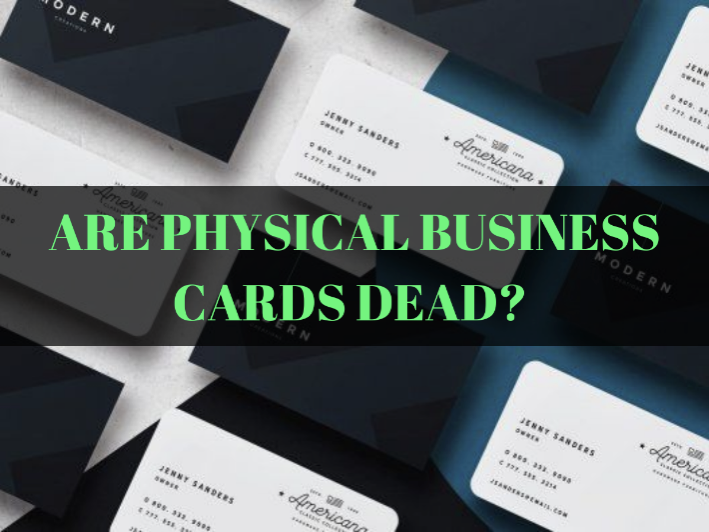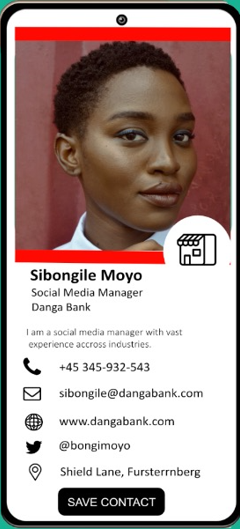BUSINESS CARDS – ARE PHYSICAL BUSINESS CARDS DEAD?

For decades it was an inseparable part of business meetings and trade fairs; all over the world, they are handed over very consciously and respectfully and often with both hands - we're talking about business cards. Will the classic paper version still exist in 2023, or will a digital transformation be required? What modern alternatives exist?
Universal, informative, haptic: paper business card? Sure, what else!
Business cards have been around since the 18th century. After changing format fashions, the pragmatic size of 8.5 x 5.5 cm became the most common format when the standard for bank and check cards was introduced in 1985.
These cards are much more than just a piece of paper. Yes, they contain information like name, title, contact options, company, and product portfolio. But they also represent a brand, show professionalism and sophistication and thus form the first impression of a company. They are easy to use and fit in purses and jacket’s pockets. More relaxed alternatives are hardly conceivable - how else would you deal with a new business contact? At a trade fair, you get into conversation, hand over your contact information with the card, and can continue to concentrate on the person and the topic without having to pull out your mobile phone and save data.
Design agencies and printers confirm: The demand for business cards has changed, simple standard models made of thin paper are out.
Outdated, lost, crumpled: paper business card? Rather not!
But what happens after the card is handed over? The recipient often enters the contact data in their CRM system, in programs such as Outlook, or the address database of their mobile phone. After that, most of the cards end up in the garbage within a few days. What a waste of resources! And there are other undeniable disadvantages of a printed business card. The supply of cards can also be used up at the wrong time - probably every printer has been begged a few days before an important event to produce a new edition as soon as possible. Flexibility is also required when half the crew at a trade fair stand has forgotten their business cards in the office. In addition, a business card can become outdated and only reflects the data at the time of printing. New job title or phone number; or an address change; And if the company's corporate design is revised, a new edition is even required for the entire workforce. Including time-consuming coordination and release procedure - and the old versions are obsolete and end up in the trash.
DIGITIZE CONTACTS
Sufficient reasons to think about new ways of passing on contacts. Because that's what the business card is all about. It is like a file that contains data about a person, a company, and their competencies. And with the spread of smartphones and increasing digitization in recent years, different approaches have proven their worth for the transfer of (personal) data. As a digital "minimal version" for easier data collection, some business cards contain an additional printed QR code with all the information that is scanned and saved.
In private, it is mostly done via mobile phone: I dictate my number to you, and you give me a quick call – data is exchanged. E-mails are a common means of communication, especially in the professional environment: A potential new supplier finds you as a contact person on the company website and sends you an e-mail. You now have his data and with the first answer, your counterpart can also enrich your data record in his address file.
Smartphones are the linchpin of our communication today. In the app stores, several applications are vying for a place on our devices, also around the topic of business cards and contact recording. Scanning apps "read" the data of someone else's business card (unfortunately not always error-free) and save it in the phone book of your device or in the scanning app itself.
Other applications create a QR code from information such as name, phone, company, and address on your device. The person you are talking to scans this code with their smartphone and the data transfer is complete. Nice idea for a single person - but not for an entire sales team.
Some apps for contact transfer require that the application must be installed on both devices - this seems to be more practical for groups of people at congresses or trade fairs that can be planned and managed.
DIGITAL BUSINESS CARDS WITH ALL-ROUND SERVICE – CONNECTANA SYSTEMS
The providers of digital business cards, who offer comprehensive services for companies with intensive customer contact, such as banks or sales units, go one step further. The core of the offer is an online database that contains digital profiles of the employees, i.e. names, titles, telephone, e-mail, website, and, if necessary, links to social media profiles from LinkedIn to Instagram. In contrast to the paper card in credit card format, the space online is practically unlimited.
Oh yes, we are talking about personal data here. It goes without saying that the provider of your choice must meet the highest standards of data protection and information security and host its data in an ISO-certified manner. And for this Connectana Systems can be your best choice.
Businesses can design their digital business cards on Connectana’s website to match their corporate identity with the correct colors, logos, and fonts. Each team member receives an individual link to their online profile, which they can share via QR code - on their smartphone or as a background for presentations or zoom meetings. If a customer scans this QR code, they can save the profile stored online on their smartphone, export it as a card to the wallet app (like a train ticket), call up the social media profile, and much more. Changes to the database, such as new telephone numbers, can be recorded daily (e.g. by the HR department) - and this means that all individual profiles always remain correct.
So: paper or digital business cards? are physical Business cards dead? The answer is quite clear – yes. Digital business cards are quickly replacing physical business cards overcoming all the shortcomings of physical business cards.

